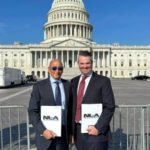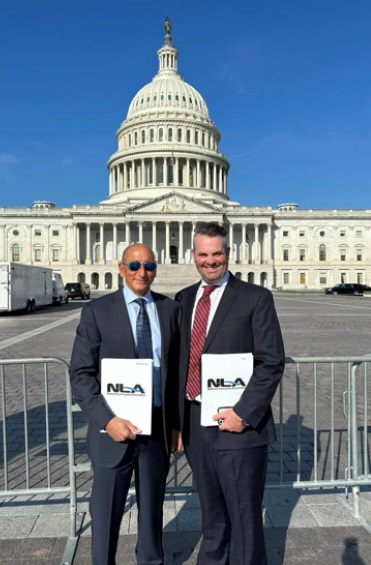 Employee Retention Tax Credit Processing: The Employee Retention Tax Credit (ERTC) was passed in 2020 to compliment the Paycheck Protection Program to help small businesses impacted by COVID-19 keep W-2 employees on the payroll. This refundable credit rewarded businesses for keeping employees during the pandemic, up to $5,000 per employee for 2020, and $7,000 per employee for the first three quarters of 2021. This credit was a major factor in our industry’s ability to retain employees. Unfortunately, lengthy delays at the IRS have prevented our members from accessing the funds they are entitled to, threatening our financial stability and undermining the purpose of the credit. On August 31st, the Treasury Inspector General released a report finding that IRS failed to begin processing ERTC claims for 12 months after the law was enacted, and as of August, over 200,000 forms are waiting to be processed.
Employee Retention Tax Credit Processing: The Employee Retention Tax Credit (ERTC) was passed in 2020 to compliment the Paycheck Protection Program to help small businesses impacted by COVID-19 keep W-2 employees on the payroll. This refundable credit rewarded businesses for keeping employees during the pandemic, up to $5,000 per employee for 2020, and $7,000 per employee for the first three quarters of 2021. This credit was a major factor in our industry’s ability to retain employees. Unfortunately, lengthy delays at the IRS have prevented our members from accessing the funds they are entitled to, threatening our financial stability and undermining the purpose of the credit. On August 31st, the Treasury Inspector General released a report finding that IRS failed to begin processing ERTC claims for 12 months after the law was enacted, and as of August, over 200,000 forms are waiting to be processed.
Ask to Congress: Sign onto the congressional letter to the IRS, urging the Commissioner to take immediate corrective action and prioritize ERTC processing.
CERTS Grant Tax Exemption Act: The Coronavirus Relief for Transportation Services (CERTS) Program provided $2 billion to motorcoach and other eligible transportation service providers experiencing at least a 25% revenue decline due to the pandemic. This provided essential relief to many NLA members. However, this grant relief pales in comparison to the estimated $40 billion in lost revenue throughout the CERTS-eligible industries. In addition, CERTS grants are considered taxable by the IRS, reducing their value to recipients still struggling to return to normal business operations due to the pandemic. Other pandemic relief programs, including the Paycheck Protection Program, were amended and clarified by Congress to ensure these funds were not considered taxable income, maximizing their effectiveness as a relief program. We urge Congress to ensure similar treatment for the CERTS Program.
Ask to Congress: Please cosponsor H.R. 7477, the CERTS Tax Exemption Act, which would exclude CERTS grants from taxable income and maximize the relief afforded to transportation operators. To sign on, please contact Mark Denin (mark.denin@mail.house.gov) in Rep. Panetta’s office, or Greg Warren (greg.warren@mail.house.gov) with Rep. LaHood.
Airline Pilot Shortages: Airport transfers are a critical business for NLA members. The recent spike in flight delays and cancellations has placed a major burden on our industry, causing follow-on ride cancellations, schedule disruptions, and leaving our drivers idle at the airport during a time when labor shortages and supply chain disruptions have our fleets struggling to meet demand and get passengers from point A to B on time.
The biggest cause of these increased flight delays and cancellations is a lack of available crews. There is a severe and growing pilot shortage in the United States, and to make matters worse, roughly 5,000 fully-qualified pilots will be forced to retire within the next two years due to the mandatory commercial pilot retirement age of 65.
NLA supports the Let Experienced Pilots Fly Act (S.4607/H.R. 8513), which would raise the mandatory retirement age from 65 to 67. In 2007, the retirement age for pilots in the United States was raised from 60 to 65 after medical reports concluded age had an ‘insignificant impact’ on performance in the cockpit and there were safety precautions already in place to prevent accidents in case of incapacitation. Nothing in this legislation changes current safety and proficiency procedures for commercial pilots. Pilots will continue to be held to an incredibly high standard to ensure passenger safety.
Ask to Congress: Cosponsor S.4607/H.R.8513, the Let Experienced Pilots Fly Act, which helps alleviate the growing burden of pilot shortages on the entire travel ecosystem. To sign on, please contact Kaitlin Burt (kaitlin_burt@lgraham.senate.gov) in Sen. Graham’s office.
Worker Classification: The current worker classification framework creates confusion, legal exposure, and an uneven playing field as businesses attempt to navigate a complex patchwork of state, local, and federal laws and myriad regulations and legal precedents to determine how their workers should be classified. In addition, there is no opportunity for workers to voluntarily assert their independence and no space for businesses and workers to develop work arrangements that blend elements of independent work with workplace benefits traditionally only available to employees. This status quo prevents businesses from offering innovative benefits to equip workers in the 21st century.
NLA supports H.R. 8442, The Bipartisan Worker Flexibility and Choice Act, a compromise between the overly-broad proposals recently introduced in several states and the status quo. The bill establishes a new work arrangement that combines the flexibility of independent work with certain workplace protections and opportunity for additional benefits. The relationship between the worker and the entity would be clearly defined through a “worker flexibility agreement” and voluntarily agreed to before work begins. Specifically, the agreement would:
Ensure the worker retains the freedom and flexibility to accept or reject offers to provide their services.
Ensures certain workplace protections, including against discrimination, retaliation, and harassment.
Allows the worker to engage with and provide services for multiple entities at any given time.
Provide the worker a written summary of any health, pension, training, other benefits they may be eligible to receive.




















